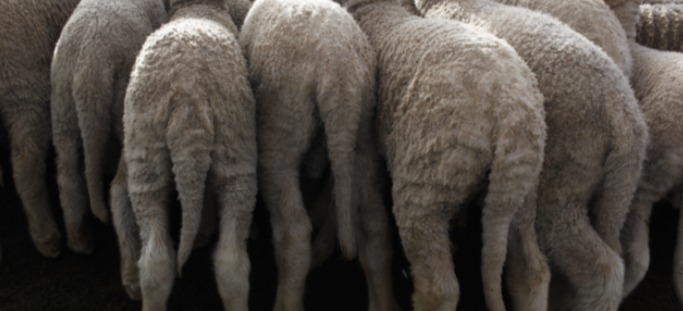
LAMB marking pain relief has more than halved losses in a large CSIRO trial involving Merino and crossbred lambs.
The trial involved about 1600 lambs, and has statistically indicated that increased lamb survival, rather than weight gain to weaning, was the major benefit of treatment with the non-steroidal anti-inflammatory product buccalgesic at marking.
The research showed that lamb losses were significantly lower in the lambs that received Buccalgesic — 1.1 percent losses — than among lambs who received no pain relief — 2.7pc losses.
In a paper in the Australian Veterinary Journal, author Dr Ali Small, CSIRO’s principal research scientist at the CSIRO McMaster Laboratory in Armidale, New South Wales, said the lamb loss observation is worth validating in larger studies, particularly considering that lamb mortality is a significant cost to production and a welfare concern.
SustainaWOOL program manager Dr Paul Swan said the comprehensive study has, for the first time, shown that there is a halving in the mortality rate up to weaning among lambs treated with pain relief at marking.
“It is just showing that there is a win-win here – welfare and productivity.”
He said the study should be of great interest to all growers as they seek more information about the new pain relief technologies, with some growers seeing these new technologies as “just a cost”.
Dr Swan said the trial results also come at a time when restocker first cross ewe prices were at record levels.
“If you halve the rate of lamb mortality, even at a relatively low level, say 2pc to 1pc, the number of additional ewe and wether lambs you retain would probably more than pay for the cost of the treatment.”
In the recent Wool Connect conference, FOUR PAWS International’s head of campaigns – farm animals and nutrition Nina Jamal said the next priority animal welfare issues would be “other mutilations like tail docking, castration” and also reducing stress during shearing.
Dr Swan said the CSIRO study was a really positive piece of science.
“It’s a great study and something CSIRO should be proud of – and the timing is really important to help inform the debate.
“The best way for these debates to unfold is with a full set of information.”
In the trial, lambs were tail-docked and/or castrated with rubber rings at mean ages of 2-8 weeks and treated with Buccalgesic in the cradle. The active ingredient in Bullalgesic is the non-steroidal anti-inflammatory drug (NSAID) Meloxicam, that acts systemically for 48-72 hours. According to Hamilton veterinarian Dr Andrew Whale, it is ideally given 15 minutes prior to procedure, but can be given in the cradle. The S4 product is given via an oral gel in the side of the cheek. The dosage cost for a 15kg animal is estimated at about 70 cents.
Data on pain relief production benefits is lacking
In the paper, Dr Small said the provision of analgesia at the time of marking has been adopted by the Australian sheep industry, but data on production benefits are lacking.
In the current study, alternate lambs were provided with either meloxicam (non-steroidal anti-inflammatory drug [NSAID], n = 781) or no analgesia (NONE, n = 822) at the time of ring castration and tail docking. Six distinct management groups of lambs were studied. Lambs were weighed immediately before marking and then again at weaning.
Dr Small said there was no significant effect of treatment on average daily gain between marking and weaning in cross-bred lambs. In Merino lambs, average daily gain was 5 g/day lower (P < 0.005) in lambs receiving NSAID, but this may not be biologically significant.
Collaborating researchers in the study included S. Belson, H. Brewer and S.M. Schmoelzl.
Click here to read the paper Marking to weaning production aspects of lambs provided with NSAID analgesia compared with lambs receiving no analgesia at the time of elastrator ring marking.

HAVE YOUR SAY